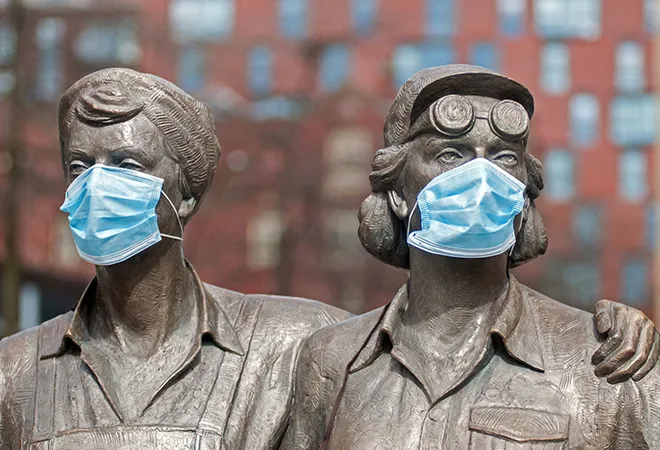
Author and journalist Helen Lewis has described the COVID-19 pandemic as “a disaster for feminism.” Women and girls are the worst affected social group across the world and the pandemic is already reversing most of the gains that women have made in the last century. In India, several states are considering or implementing an increase of daily working hours from eight to twelve hours and some have proposed dilution and removal of labour laws which may implicate key provisions around maternity and welfare. Hunger, unemployment, and domestic violence are on the rise and as per some news reports, women are also victims of police brutality. Currently, India ranks 112 out of 153 countries in the World Economic Forum’s Global Gender Gap Index 2020. Given India’s poor track record on gender rights, the disproportionate impact wasn’t entirely unexpected. However, policymakers and society must respond to the specificities of this new gender burden and work together to create a framework that would protect, enable and empower women in this world dramatically altered by the pandemic.
Women and girls are the worst affected social group across the world and the pandemic is already reversing most of the gains that women have made in the last century.
Scoping the impact
The pandemic and the consequent lockdown have adversely affected women from all strata of Indian society. With children out of school, heightened care needs of the elderly, and the absence of the quintessential domestic help, the lockdown has led to an enormous burden on the small proportion of the educated Indian women from the middle and upper-middle classes engaged in formal paid work. Many of these women have also experienced a drop in their wages due to pay cuts and prospects of layoffs loom amidst the crisis. Access to paid and formal employment will become even more scarce for many of these educated and qualified women as many couples will be forced to make the difficult choice of who should stay at home and who should be the breadwinner. In a country where women staying at home is still appraised favourably (seen as a reflection of a family’s economic and social status), women have had to struggle for their right to education and to be independent and employed. The developments arising out of the pandemic could be regressive and affect the quest for gender equity in the country.
Traditions that conspired to keep a woman at home may have an ally in the emerging economic landscape. Women are paid relatively lower wages, employed at lower positions and are more likely to be retrenched before their male counterparts. Their dispensability for an organisation is shaped by an assessment that ‘her’ first commitment is always the family and home.
In a country where women staying at home is still appraised favourably (seen as a reflection of a family’s economic and social status), women have had to struggle for their right to education and to be independent and employed.
For much of the poor and more vulnerable women who work in the informal sector, the pandemic and the ensuing lockdown has led to a complete loss of livelihood and robbed them of their dignity. Media reports, social media accounts and news bulletins are replete with heart-wrenching stories of stranded women, hungry and in despair, many pregnant or with infants, walking miles without hope or help. Tragic deaths of families and children, stories of babies delivered on the road, and of women dying due to lack of access to specialist obstetric care during childbirth do not seem to have woken up the polity of the country to the urgency of the situation. The apathy of the state captured in images is further exacerbated by accounts of police brutality.
Many adolescent girls are likely to drop out of school permanently to support their families, negating the modest gains made by the Indian state in closing the gender gap in education. The impacts on elderly women, especially widows, will be worse because of their vulnerability to COVID-19 and financial dependence on others. The working conditions in many of the sectors such as the textiles and garments sector, hospitality, handloom, traditional crafts, and care work which employ more women will worsen as small enterprises will witness declining order books and growing pressure to retrench workers. Employment will be uncertain, working hours will get longer, wages lower and women’s health considerations weaker.
The impacts on elderly women, especially widows, will be worse because of their vulnerability to COVID-19 and financial dependence on others.
Given these and other impacts of the pandemic on women such as rise in domestic violence and mental health problems, there is an urgent need for gender-sensitive social safety-nets, such as unemployment insurance for women, direct cash transfers, adequate food rations, medical attention for pregnant and sick women, and new and renewed job creation efforts. Despite having a women in-charge of the national treasury as India’s Finance Minister, the government’s policy responses have been gender-blind. Initiatives like the direct transfer of Rs 500 to women Jan Dhan account holders and an advance pension of three months for the widows along with a grant of Rs 1,000 are grossly inadequate. This paltry support will not allow women to even cover the basic sanitisation costs (soaps, masks, gloves et al) required to protect themselves from COVID-19 even as lack of access to clean toilets and clean drinking water will place them are higher risks.
Policy response
The pandemic calls for greater consultations between the Ministry of Finance and the Women and Child Ministry to understand the differential impacts of COVID-19 on women and effective policy measures to address them. As equal citizens, Indian women can and do expect the state to support them during a crisis. India is still in its early stages of dealing with COVID-19. As such, there is an opportunity for putting forth corrective measures and progressive arrangements. Some immediate steps that the government may adopt include:
• Universalise cash transfer for women for the next six months: As mentioned above, a cash transfer of Rs 500 to women Jan Dhan account holders for three months under the Prime Minister Garib Kalyan Yojana is grossly inadequate. We must appreciate that unpaid work by women also supports the formal economy by reducing the cost of care and compensates for India’s poor social services. The government’s decision to open liquor shops during the lockdown may deplete access to money for women and children. Several studies have found that cash transfers to women have a positive impact on women and girls and communities. To help women tide over the drastic economic loss due to the lockdown, the government must announce a universal cash transfer of at least Rs 5,000 to women for the next six months.
• Support to women facing domestic violence: The lockdown has led to a spurt in domestic violence cases in India. To help women file complain and seek help, the National Commission for Women has launched an emergency WhatsApp number in addition to online complaint links and emails. But to ensure that women are able to file complaints against abusers fearlessly, the government must provide abuse victims with a safe place to stay away from the abuser. However, shelter homes in India are currently not admitting abuse victims out of fear of the spread of the virus and most of them lack adequate facilities. To provide a safe space for abuse victims, governments must ensure adequate facilities and social distancing in shelter homes.
• Universalise public distribution system and extend food grain transfer by another six months: Similarly, the transfer of 5 kg of rice/wheat and 1 kg pulses per person to poor households for three months (i.e. till June) is not enough because the pandemic and its economic consequences are unlikely to be over by June. Therefore, there is an urgent need to universalise grain transfers for the next six months at least.
• Extend MGNREGS to urban areas to help the urban poor: The move to increase the MGNREGS wage to Rs 202 per day from Rs 182 per day and an additional allocation of Rs 40,000 crores are steps in the right direction. However, given the large-scale unemployment in urban areas and the hardships of the large number of migrant workers who are still in urban centres, MGNREGS should be extended to the urban areas to create jobs for the urban poor. This will be especially beneficial for a large number of women, particularly domestic workers, who will fail to find employment as middle-class women stay at home and focus on unpaid care work.
• Expand the ambit of MGNREGS to include handicrafts/folk arts: COVID-19 is a death blow to India’s craft sector which stares at a collapse of demand for its products. Women constitute about 1% of Indian artisans and play an important role in preserving handicrafts and art but have been completely left out of the relief package. Without government support, these crafts may be lost forever. Therefore, MGNREGS should be re-designed to include crafts and folk art (folk theatre, music, painting, etc). For instance, an artisan can teach her skill to children under MGNREGS. Including crafts and folk arts under MGNREGS will achieve the twin objectives of providing income support to poor women and preserving Indian handicrafts and arts.
• Support to Women’s SHGs through demand creation and moratorium on loan payments: The announcement of expanding the limit of collateral-free lending to Women’s Self Help Groups (SHGs) from Rs 10 lakhs to Rs 20 lakhs is another welcome step but the main problem before SHGs is demand shortage. Activities like tailoring, milk business etc has come to a complete halt. To revive women’s SHGs, the government should support industries like the food processing sector and textiles and garments sector (another sector where women account for the bulk of the workers) which are the main buyers of SHG products and institute a moratorium on loan payments for the next six months.
• Special provisions for pregnant and nursing mothers: Unfortunately, the Finance Minister’s COVID-19 relief package had no special provisions for pregnant and lactating mothers who are enduring immense hardship under the lockdown. Under the Maternity Benefit Programme, pregnant women and lactating mothers already receive a cash transfer of Rs 6000 in three instalments. Keeping in mind the loss of livelihood and incomes, the government should enhance this amount and provide special rations for pregnant and lactating women. The government should also help them protect themselves from the virus by directly providing safety kits including masks, sanitisers, soaps, etc. Some states like Jharkhand have started a 24/7 maternity/pregnancy helpline to help access necessary medical assistance during the lockdown. This initiative should be implemented at the national level as well so that pregnant women, particularly migrant women who are on the road, are not deprived of medical attention.
The views expressed above belong to the author(s). ORF research and analyses now available on Telegram! Click here to access our curated content — blogs, longforms and interviews.




 PREV
PREV


